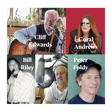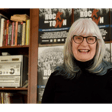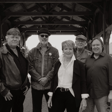
Guest Glimpses - Keith Sharp RETURNS, Rick Mason, Kim Berly RETURNS, Frank Marino
This is the 32nd episode of our special series ‘Guest Glimpses’, short bits from longer conversations with previous guests. You’ll hear about 10 minutes of each guest’s 60+ minute chat with show host Dan Hare. Featured guests this week are:
KEITH SHARP RETURNS, founder of the iconic Canadian music magazine Music Express and author of the book “Music Express: The Rise, Fall & Resurrection of Canada's Music Magazine”. In this clip Keith recaps a bit of the history of Music Express; talks about the complexities of the late Myles Goodwyn; explains the biggest problem facing legacy rock bands and more.
RICK MASON, composer, musician and drummer of the iconic band The Mynah Birds. In this short clip Rick talks how being friends and bandmates with Rick James; why The Mynah Bird’s record was pulled from radio hours before it’s debut; how Neil Young came to be in the band, and more.
KIM BERLY RETURNS, Juno award-winner, SOCAN lifetime achievement recipient, drummer, singer and songwriter for the Canadian classic rock band The Stampeders. In a clip from this follow-up chat, Kim talks about: what he does to keep in shape; his bandmates; performing live these days, and more. NOTE: since this interview originally aired in September of 2023, bassist/singer/songwriter Ronnie King has passed away. He is missed.
FRANK MARINO, Canadian icon and guitar virtuoso, singer and leader of the band Mahogany Rush. In this short clip Frank shares: the one thing he did that other bands of the time weren’t doing; why planning doesn’t work; his philosophy for life and music, and more.
LISTEN to the full interview with each guest @linernotes.ca



















